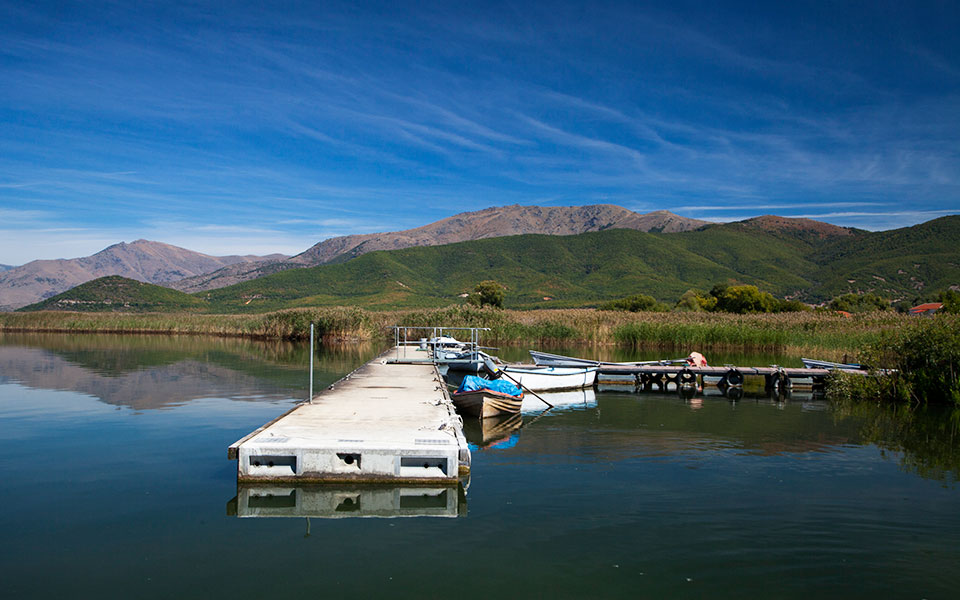First I saw a hawk. Like a chaperone on the border of the regional units of Florina and Kastoria, it floated above the car for several kilometers. Then, a black wild boar ran to the edge of the road, and disappeared into the forest. By the time the evening rolled around, rabbits, pine martens, wild cats and countless birds had all made an appearance. I kept searching for a bear, but without any luck.
“They usually come out at night, and disappear long before you catch a glimpse. Of course, they are more active in the autumn as they feed all day in preparation for storing fat to hibernate in the winter. It is even harder to spot a wolf,” naturalist David Koutsogiannopoulos informs me. I met him in Prespa, where he is looking to record the carnivorous plant Aldrovanda vesiculosa for naturagraeca.com.
Within a few hours I meet many interesting people here, all in search of something – Fanikos who is looking for the differences between two rush species, and how one impedes the other; Polina working on her thesis on ecotourism; a German couple, both biologists; a group of Dutch nature lovers and several Greeks – one searching for a type of bat, the other looking for the Colchicum autumnale autumn flower, another studying bird nesting. Even cows in Prespa are worthy of study and observation, as they belong to the rare Greek Steppe breed (Nanas cows).
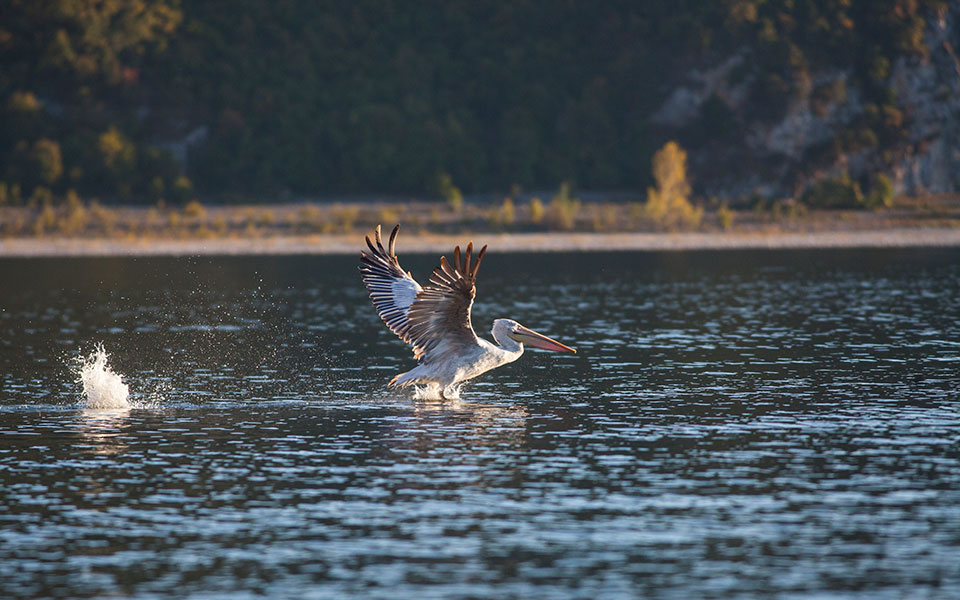
© Olga Charami
“More than 275 species of birds have been recorded, but the most important aspect is nesting. Approximately 160 species are known to nest here, and Prespa is one of the most important sites in Europe for nesting – especially for water birds. Prespa also boasts the largest Dalmatian pelican colony in the world. A mixed colony composed of two species (Dalmatian and Great White pelicans together), make up 25% of the world’s population,” explains Olga Alexandrou from the Society for the Protection of Prespa, whose actions have made Prespa what it is today.
In reference to the Prespa National Park, she talks of a hotspot of biodiversity, one of the most important in Europe. “More than 60 mammal species live here, while this is the most important European site for bats, with 26 different species. In addition, we have 23 fish species, 9 of which are endemic. Of the 235 lepidoptera (butterflies and moths) found in Greece, 178 have been recorded here, and of the country’s 6000 plant species, approximately 2200 are also found here – about one third.”
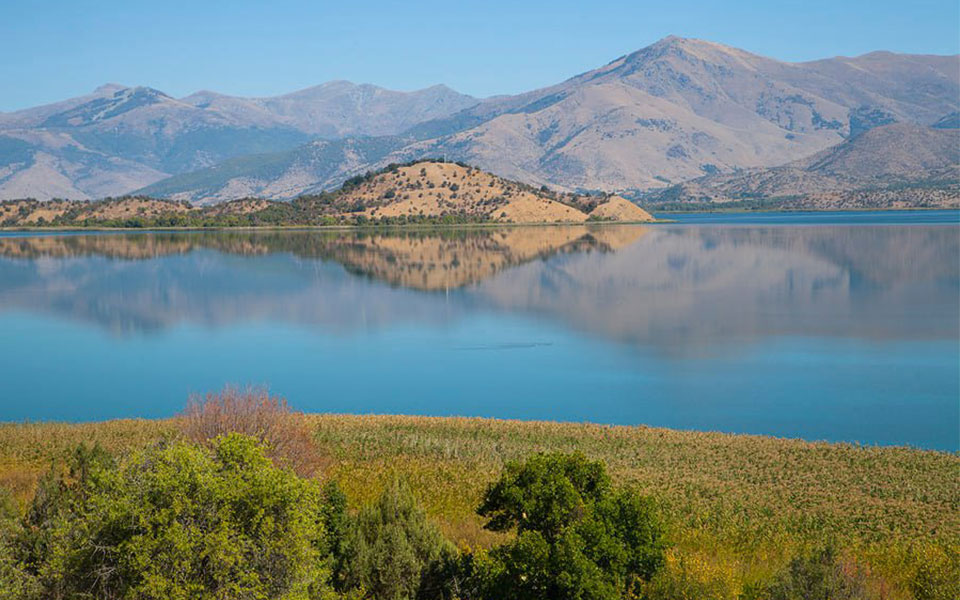
© Olga Charami
A special National Park
The Society for the Protection of Prespa came here in the 1980s, when the idea of protecting nature was unknown to the local community. The Prespa National Park was created in 1972, mostly because of the forest of centenarian juniper trees aged over 400 years old, and then because of the birds. One particularity of this place it that it transcends borders – in fact, this region is divided between three countries and its preservation requires collaboration. The Society and now the Municipality make great progress, and after managing to declare this area a park that goes beyond geographical borders, they recently organized a first meeting about a common plan of action.
Another particularity is that this National Park is actually inhabited. As strange as it may sound today, in 1991 when the Society was founded, many people would eat pelican eggs, and even the pelicans themselves. Yet, without knowing, they were actually helping the survival of the ecosystem. Though probably by chance, their tactics were consistent with its preservation: for instance, the rushes and reeds they chopped down from the banks of the lake to make fishing equipment with or to construct their houses and pens, actually offered the wetlands the breathing space, as well as the literal space, for fish to reproduce – and hence, provide food for the birds.
What about now that we have more modernized tools and practices? “We still use cutting machines because if the rushes and reeds go wild, this will be a great problem. At the same time we encourage locals to cut the reeds for animal fodder, to bring their herds here to graze, while we are also studying additional uses we could propose,” says Ms. Alexandrou.
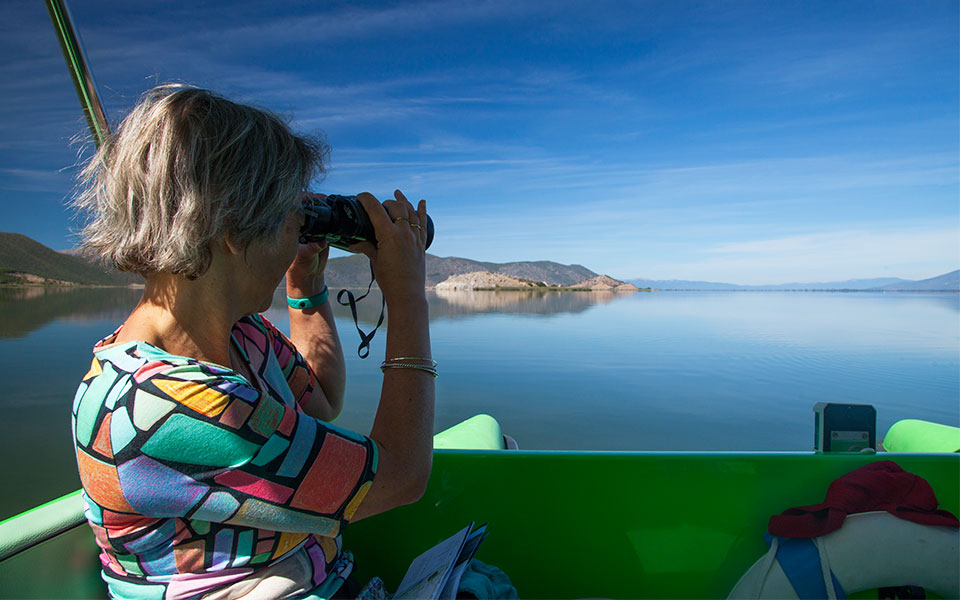
© Olga Charami
This was no mean feat, says Triantafyllia Gogkou from the Management Body, the organization responsible for the Park: “Imagine telling someone not to cut the reeds here, because this is the only place in Greece where the common merganser nests. Instead, cut from there, but not during this time of the year, when we tell you. What would this person understand exactly? Or that from April to June, fishing is not permitted, and hunting is only allowed in this area, during these specific months. Now, everyone knows and there is collaboration.”
The Society for Protection, Management Body, Municipality, Ministry of Environment and Energy, farmers, stock breeders and other representatives have created the Wetland Management Committee, which convenes every February to manage matters that have arisen. Most importantly, they meet to decide whether the dam should be opened to allow the waters of Mikri (Little) Prespa into Megali (Big) Prespa, and from there flow to Ohrid.
Of course, the greatest problem is climate change, the effects of which are decidedly visible here, in Prespa, considered one of the most ancient lakes in Europe.
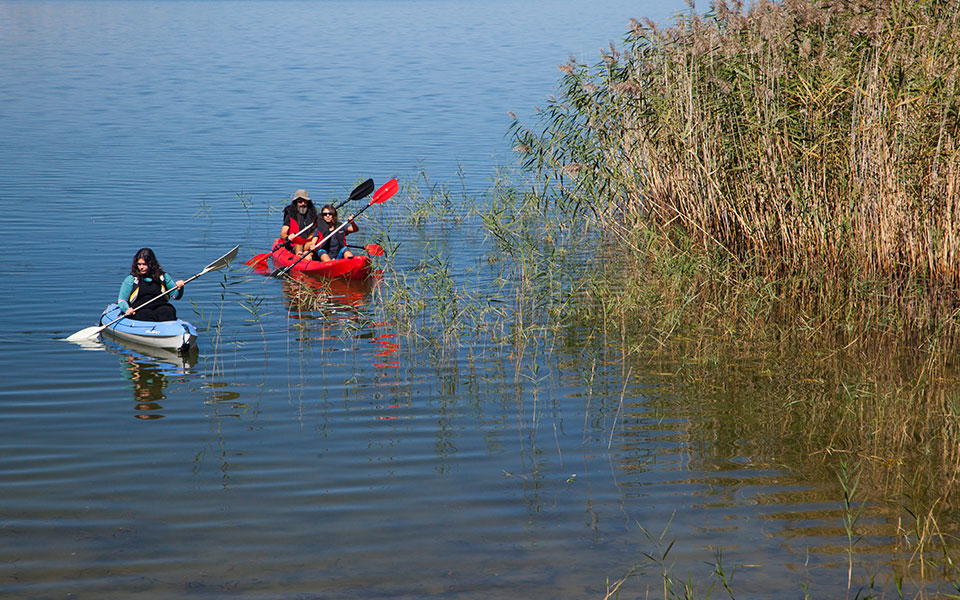
© Olga Charami
People adapt
The locals now realize that they are living in a National Park, where they have to co-exist with the animals and birds. Christina Christianopoulou, owner of the Syntrofia stous Psarades taverna, has accepted the fact that she will not be serving her specialty, carp with tomato, from May to June because that is mating season. Fishermen and boats no longer go near the pelican colonies, since disturbing and frightening the birds might lead to the birds cracking their eggs by mistake as they take flight in a rush.
Christos, who organizes outdoor activities, knows that he will not rappel down the rocks of Koula in Megali Prespa in January, as this is the mating season for the horned owl. He also does not set off with canoes without previously informing the Management Body. Nikos Marmaridis, exploration guide, offers advice to avoid running into bears. People who swim in Lemos Beach know that one of the most important priority ecosystems in Europe is right next door: the coastal birch tree forest with alders and weeping willows that is home to wolves, deer and bears.
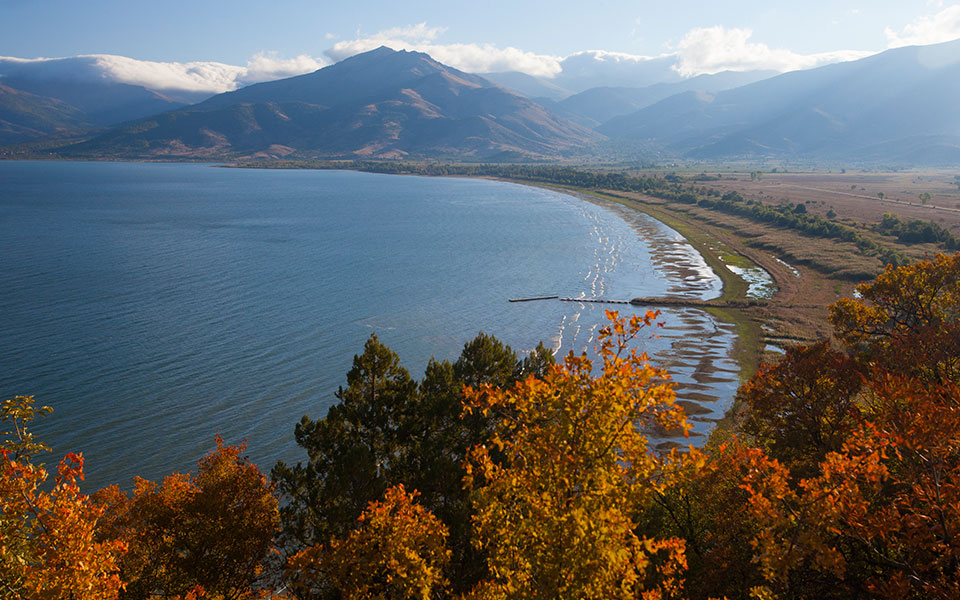
© Olga Charami
Youngsters Manos and Vassilis Dimitrakopoulos, who created Prespa Top, a local unit that packages beans and processes peppers thus taking the famed local production one step further, are anxiously looking forward to a new trickle irrigation system that will be completed in three years, and will protect the lake from eutrophication. Ilias and his two young sons, who live in Aghios Achillios, know that when they go out at night on the lake islet they need to beware of the bears, who come down to the parking every 4-5 days and empty the dumpsters. Of course, there are still reactions to deal with. The area’s stock breeders, whose animals are often attacked and killed, do not hesitate to take arms.
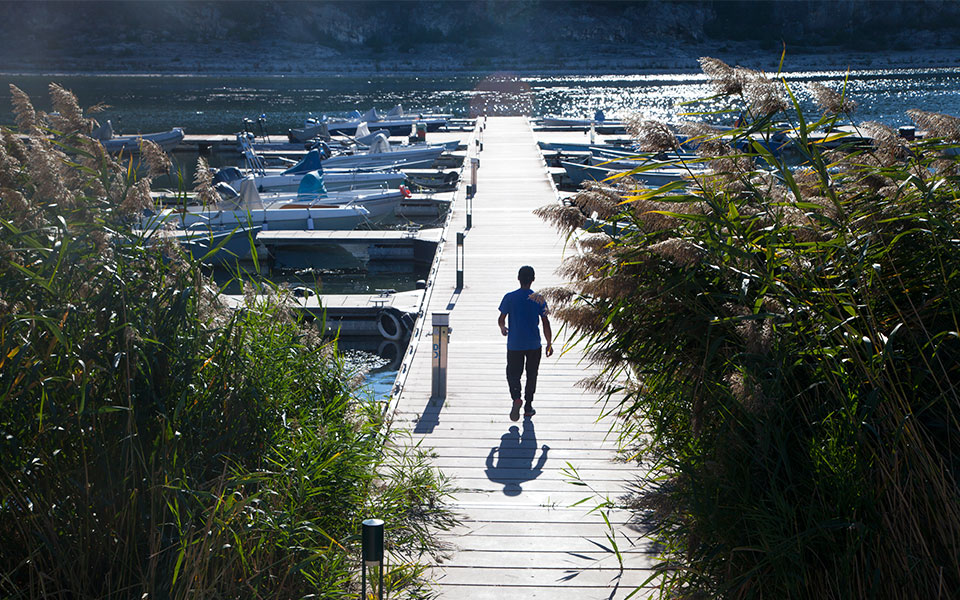
© Olga Charami
Much of everything around us has been adapted for the animals and birds, though this may not be obvious at first sight: for instance, the electricity cables along the length of Koula, the isthmus dividing Mikri from Megali Prespa, were replaced with one single inverted cable, large and thick, so that it is easily perceived by the birds. Or even the bridge of Agios Achillios, featuring some metal connecting parts that are sharp to prevent the bears from crossing over to the island, as their feet get injured.
Yet Prespa has begun opening up to the world. In addition to the border guard patrols, the lonely birdwatchers, the bean producers, the naturalists, the Byzantine scholars who study, preserve or just observe the great monuments of the area, you also see younger people settling here to get involved with the preservation or promotion of nature, either by setting up new production units or by engaging in tourism. But the charm of the lakes and borders remains the same.
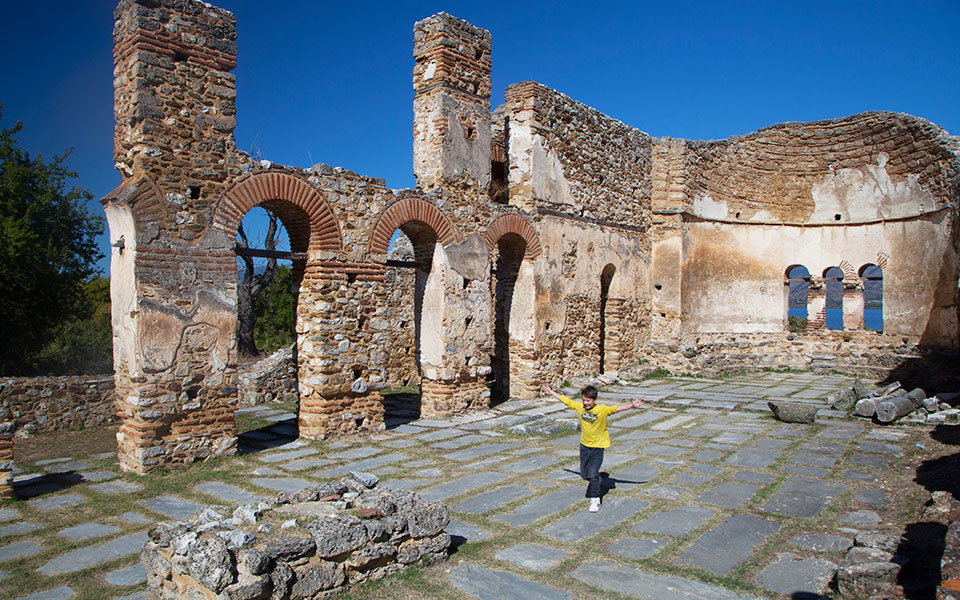
© Olga Charami
On the islet of Aghios Achillios, with a bridge measuring 650 meters and the unique ruins of a church dating from the 10th century, or the peaceful walking route surrounding it that leads to many more sites. In Agios Germanos – the only village with beautiful old houses, a church with amazing wall paintings, and a watermill built by architects Agela Georganta and Achilleas Stoios, as well as the alpine landscape of Varnounta which boasts extraordinary views of the entire complex. In Miliona, with its brick houses, you learn the wisdom of old building techniques.
Mikrolimni is famed for its fishermen, its quaint taverna and boat rides on Megali Prespa, newly organised by the municipality using solar-powered vessels. Along the footpaths of Deva and at Psarades, a charming deserted village on the water border, you can take a lovely boat ride through the waters of three nations, and see the hermitages, the “nests” and wall paintings on the rocks of Megali Prespa, built by hermits during the Byzantine era.
As you drive at night, you need to be very careful and go slowly, as an animal can wander onto the road at any given moment. Always and everywhere, you feel dozens of eyes looking at you from the forest. Even when you lie down, you know you are not alone. You have complete awareness of a parallel life unfolding out there.
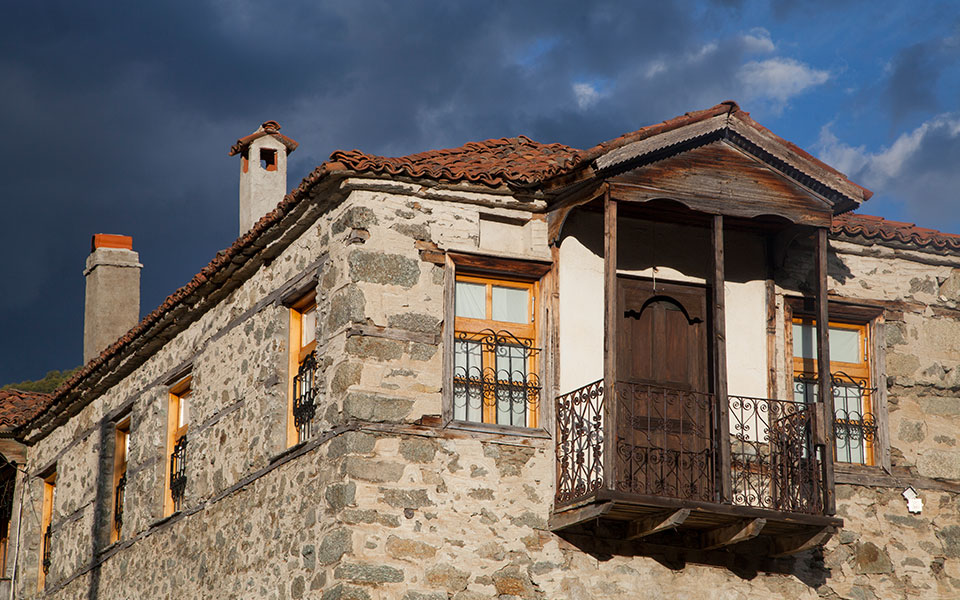
© Olga Charami
Stay
There are no large hotels or luxury guesthouses in the area. Opt for the Agios Germanos guesthouse (tel. 23850-51397, prespa.com, from 50 euros with breakfast) in the village of the same name. The guesthouse is located in a 19th century structure and has well-kempt rooms with a fireplace.
Alternatively, go to Wildlife and Culture (tel. 23850-51911, wildlifeandculture.com, from 45 euros with breakfast), also in Agios Germanos, which also organizes excursions and activities.
The Serene and Secluded Stone House is a different option (tel. 6946-626243, from 150 euros for two nights), at an amazing location bustling with nature, in Oxia.
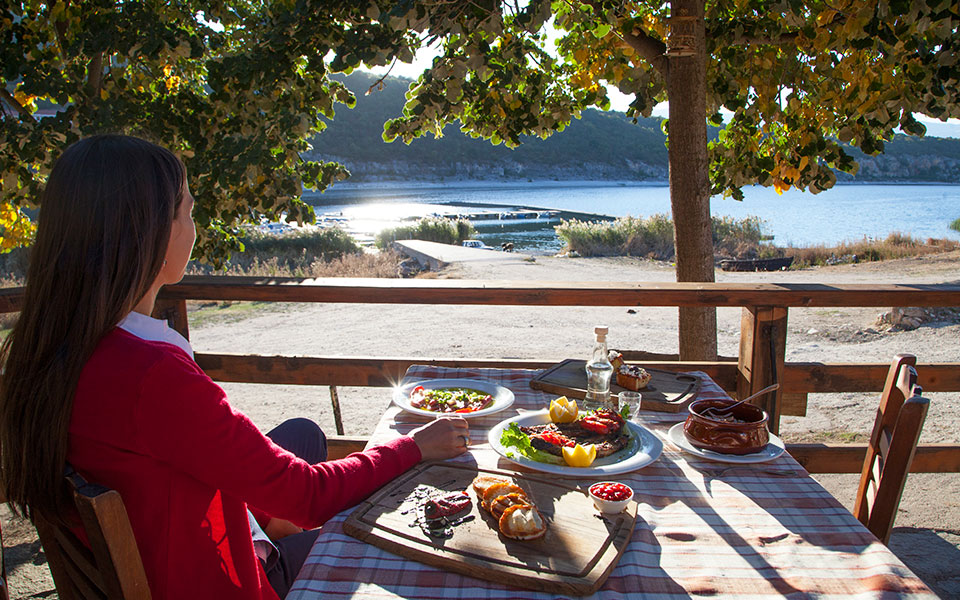
© Olga Charami
Food – Shopping
You will taste very particular flavors in Prespa. Everyone uses fresh local ingredients, fish from the lake, rare Greek Steppe breed cattle, local protected designation of origin broad beans, Florina peppers and local florinella cheese made from goat’s milk. At Syntrofia (tel. 23850 – 46107) in Psarades, Christina and Germanos will welcome you as if you were genuine friends. This family taverna, a classic for many years, has its own fish and gardens, with peppers used to make spreads and jams. Delicious broad beans cooked in clay pots, amazing lake carp grilled with tomato, fried rutilus fish, mushrooms, kebab with crushed red peppers and many more dishes, prepared with gusto and pure ingredients. If you do not want to head too far, they also have simple rooms to let.
You will most certainly visit Mikrolimni for the Psaradika tou Hasou (tel. 23850-46803), the first kafenion (coffee shop) in Prespa that has been turned into a restaurant under Zenia and Kyriakos, two active young people who settled here permanently. Wonderful views of Mikri Prespa, delicious dishes that discreetly play with local flavors and folk music. At Agios Germanos take a seat at Prespion (tel. 23850-51442), a lovely space where you can enjoy local dishes prepared by Nikos, and also at the taverna at Agios Achillios (tel. 23850-46601).
Beans, crushed red peppers and peppers in many versions are widely available. We prefer the jams by Christina Christianopoulou at Psarades, products by Prespa Top by the Dimitropoulos brothers in Lefkona, and another classic, the beans of the Pelecanos farming collective in Lemos.
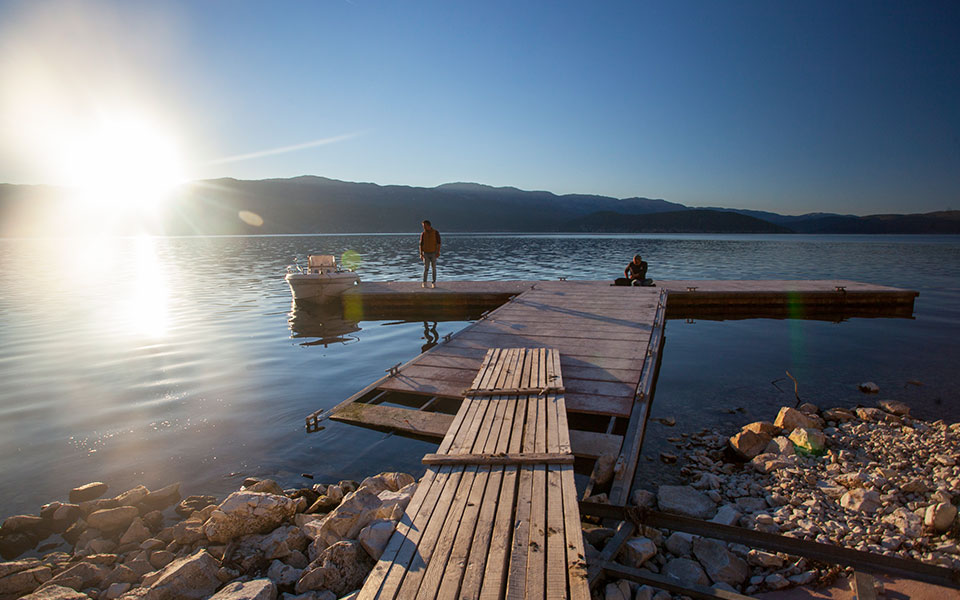
© Olga Charami
Visits – Activities
On the boat ride on Megali Prespa you will see icons of Saint Mary of Vlachernae (1455), Saint Mary Glykofiloussa (1373) and Saint Nicolas (1827) painted on the rocks, as well as three hermitages on the Greek rocks (there are four more on the Albanian side): the Transfiguration of Jesus from the 13th century, the Ascension from the 15th century and Saint Mary Eleousa, also from the 15th century. One more was recently discovered, Saint Athanasios from the 13th century, which is currently being renovated to allow for visits. Germanos Christianopoulos (tel. 6942-503863) or Adam Trianopoulos (tel. 6974 – 108433, varkadaprespes.gr) will take you there with their boats, give you a lovely tour and show you the Tripoint.
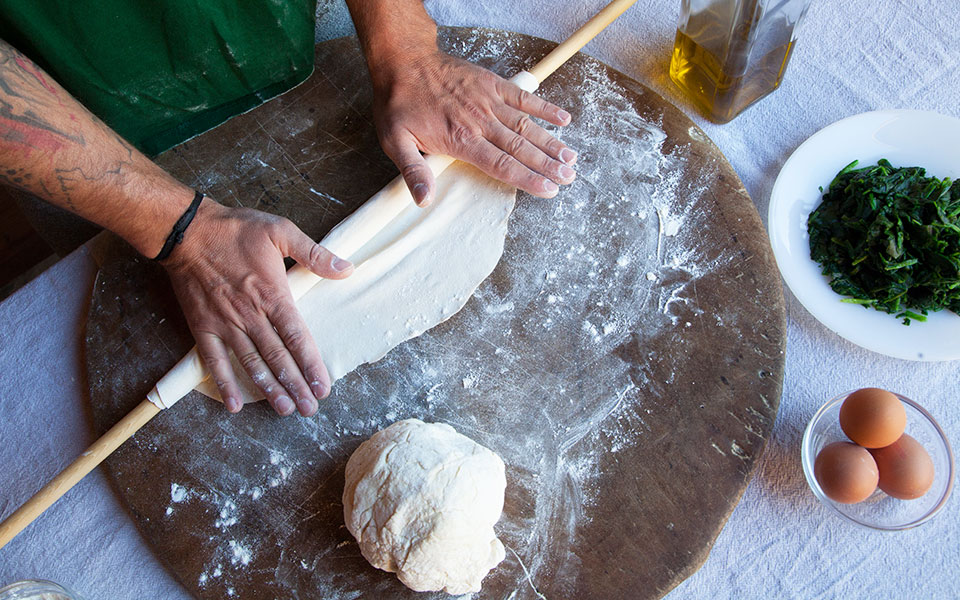
For cycling, canoeing on the lakes, hiking, climbing or parachuting contact Prespa Lakes Wildlife and Culture (tel. 6976-876423). Depending on the weather and always in communication with the Society for the Protection of Prespa and the Management Body, you will enjoy the magic of the lakes from a different perspective.
For cultural activities, guided hikes, cooking workshops, volunteering opportunities, boat rides with the municipality’s solar powered vessels (Thursday – Sunday, 11.00-14.00, from Mikrolimni or Agios Achillios), contact Prespa Lakes Wildlife and Culture and president Nikos Marmaridis (tel. 6944-305386). For touring advice and suggested hiking routes speak to the Management Body (tel. 23850-51870) and the Society for the Protection of Prespa (tel. 23850-51211).
Tip
There is an ATM in Lemos, Municipality headquarters, and petrol stations on the main road near the villages of Lefkonas and Plati.

